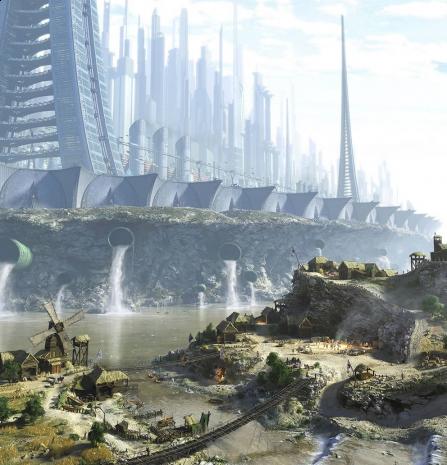|
The City Gates Are Always Open |
|
The Hunger Games (2008) was the first of a series of science fiction novels written by Suzanne Collins that depicted a future dystopian society set in a North American country called Panem. These novels were made into several films starting in 2012. Panem consisted of 12 districts in varying states of poverty ruled by the Capitol, which was located west of the Rocky Mountains. The Capitol remained very wealthy and technologically advanced by exploiting the people and natural resources of the surrounding districts. Rivaling the European feudal lords of the Middle Ages, Panem's rulers used their armies of "peacekeepers" to maintain tight control over the people of the districts. Severe restrictions, mass surveillance, public executions and whippings were a common way of life. Communication between districts was forbidden, and no one was allowed to leave the boundaries of their district unless granted permission. Panem's ruling elite and wealthiest families comprised the residents of the Capitol. They lived in decadent ease, entertainment, and luxury. They dressed gaudily and ate sumptuously of the most exotic and richest foods. Just as some of the elites of ancient Rome gorged themselves at their gluttonous parties and had vessels in which to vomit so that they could devour more food, Capitol residents would ingest a liquid similar to ipecac to empty their stomachs so that they could eat more and more food. Like the rich man in Jesus' account who ignored the plight of poor Lazarus outside his gate (Luke 16:19-31), the Capitol residents were oblivious to the fact that while they went through large quantities of food with much to spare, district residents experienced widespread hunger and deprivation. As ancient kings imposed the payment of tribute on vassal kingdoms to exercise power over them, the rulers of the Capitol, in addition to enslaving the people and taking virtually everything away from them, would levy a form of tribute on the districts where residents were selected and forced to fight in brutal and bloody gladiatorial combat for their entertainment. To the Capitol residents, district residents existed only to make their lives comfortable and amuse them. When they ceased to fulfill this role, they were then to be eliminated and replaced. Over the past several years, the World Economic Forum (WEF) has been promoting the implementation of an urban planning concept called the "15-minute city" (sometimes abbreviated as FMC or FmC). This is described as arranging an urban area in such a way that most daily necessities such as going to work, buying food and clothing, going to school, visiting the doctor, and engaging in leisure and entertainment can all be done within a 15-minute walk or bicycle ride from any point of the city. According to its proponents, this would be a convenient way to reduce car dependency, promote healthy and sustainable living, improve the wellbeing and quality of life of city residents, and greatly reduce carbon emissions in the ongoing fight against climate change. Under the guise of climate change prevention, car ownership and use would be eliminated over time by making it too expensive and lacking the infrastructure to sustain it. Roadblocks and gates would be erected over time throughout the city. Along with restrictions on the freedom of movement, constant surveillance would characterize life, turning the FMC into an open air prison similar to the districts in The Hunger Games. Efforts are underway in Paris, Melbourne, Milan, Oxford, and other cities around the world to implement this supposedly "convenient" form of urban planning that some critics call "WEF ghettos." Residents of these cities, understanding the implications to their freedom and that globalist entities such as the WEF are promoting them, are pushing back through protests and lobbying efforts directed at their local officials to stop implementing FMC zoning restrictions against their will. Some of the residents have even taken to surreptitiously removing zoning barriers at night and disabling surveillance cameras. By faith, as Abraham wandered as an alien in the land God promised to him and his posterity, he looked for a city not of this world with the surest of foundations, built by the Architect and Builder of all things (Hebrews 11:8-10). About 20 centuries later Jesus affirmed that Abraham looked forward to His day with gladness, for he knew Him to be that Architect and Builder (John 8:56-58; Colossians 1:15-20). Jesus later told His disciples and all who would believe in Him:
The kind of cities that the WEF and its partners are trying to establish around the world eventually lead to trapping people in cages, where they are forced to live in increasing levels of austerity and poverty as global elites travel freely and live in luxury at their expense. In contrast, the new city in the new heavenly country that Abraham saw from a distance -- and which is much closer to us today -- has twelve foundation stones named after the twelve apostles, and twelve gates named after the twelve tribes of Israel. It is a place where the light of the Son shines continually, and the gates are always open, allowing its residents plenty of room to move about freely in gladness, joy, and abundant provision (Revelation 21:10-27, 22:1-5). The attempts by global elitists to create "15-minute cities" where they value their progressively confined residents for what they can get from controlling and destroying them will fail, because it will be utterly overcome by the eternal city built by God, who valued lost humanity so much that He sent His own Son Jesus to die on the cross for our sins and rise again so that all who trust in Him will live liberated from sin, death, and confinement forever.
|
|
| What Is the Gospel? | What Must I Do to Be Saved? | Home | Contact Us | Return | |
